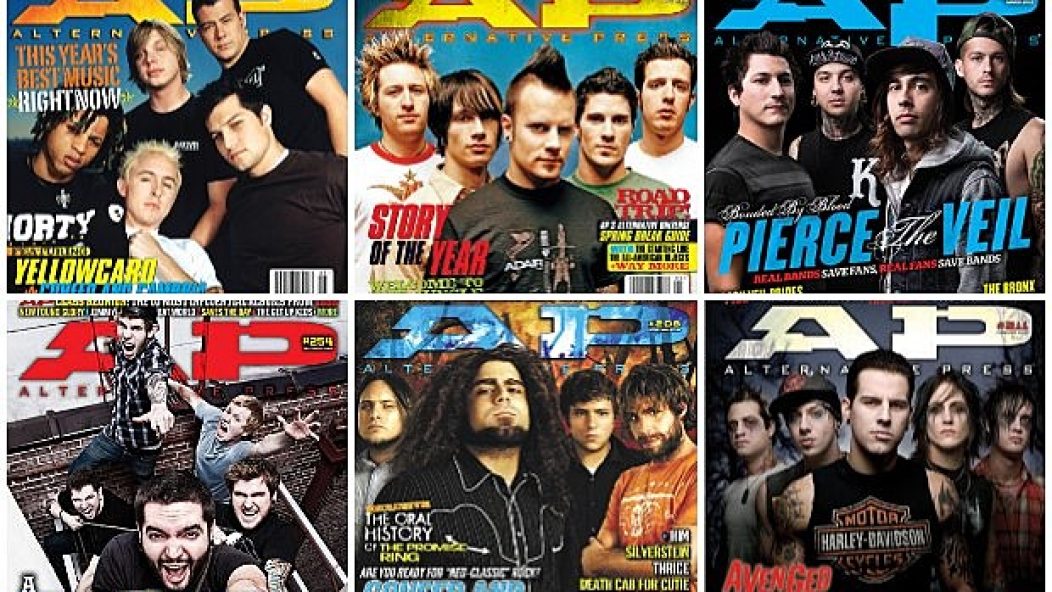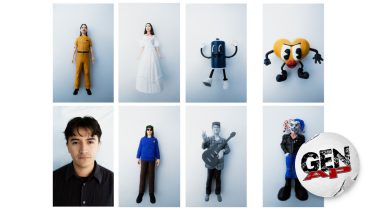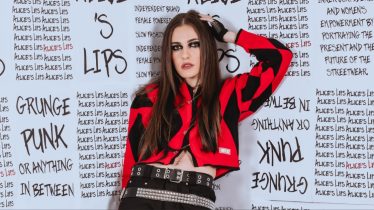
"You've Changed, Man:" 8 bands that sounded different before they hit AP's cover
Before each of these artists made their cover AP cover debuts, they were playing music far different from what fans have now come to expect from them. Whether it was just rotten quality or was a completely different genre, for better or worse, these bands weren’t afraid to change.
CONTRIBUTORS
Scott Heisel [SH]
Brian Kraus [BK]
Brittany Moseley [BM]
Jason Pettigrew [JP]
Cassie Whitt [CW]
A DAY TO REMEMBER
ADTR’s debut album, And Their Name Was Treason is a far cry from the catchy popcore that would capture fans in droves on 2009’s Homesick. With excessive cookie-monster vocals and overall an uncrisp production quality, it’s just not that great. And that’s a statement many would call “blasphemy” on if we said it about today’s ADTR. Think about how much better they got next time you whine about a band changing their sound. [CW]
AFI
To this day, we wonder if there are a significant number of listeners who have stayed with the NorCal band since the youthful abandon of their punk roots. Consider that their 1995 debut, Answer That And Stay Fashionable, runs shorter than half an hour and features such penetrating insights as “Rizzo In The Box,” “The Mother In Me” and the thought-provoking “I Wanna Get A Mohawk (But Mom Won’t Let Me Get One).” After their dalliances within a scene that frequently uses the letter “x” as punctuation marks, the band accessed a more sophisticated post-punk aesthetic more akin to Social Distortion being dropped into the playlist at your local goth-rock club. Their 2000 LP, The Art Of Drowning refined their sprawling punk roots into something far more streamlined and sophisticated, but not necessarily refined on the power side of things. The album not only introduced the band to a whole new audience, it also garnered them their first AP cover in March 2002. [JP]
AVENGED SEVENFOLD
Metal can more or less be classified in one of two simplified ways. One breeds intense feelings of sweaty, emotional unity and the other conjures visions of dragons, spells and horror. Usually the former is more hardcore-influenced and the latter more Dungeons And Dragons-influenced. By the time they reached our cover in 2006, A7X must have rolled a few 20-sided die because they landed themselves smack on the warlock-metal side of the bridge, shedding some “-core” for theatrics and melody. Oh, and that little thing where M. Shadows stopped screaming, which caused such a stir, it has become a legendary topic. Over the years, fans have declared everything from “It’s just the progression he’d envisioned all along” to “His throat bleeds when he tries to scream now.” Metaaal. [CW]
COHEED AND CAMBRIA
Coheed's origin story is almost as complex as the concept albums for which they're known. The band were born out of Shabutie, who were around from 1995 to 2001, which featured all four members of Coheed at various junctures (but never on the same release). Once drummer Josh Eppard joined in 1999 (following the recording of their Delirium Trigger EP, which was released in 2000), Shabutie began to morph into Coheed And Cambria, officially changing their name and signing with Equal Vision Records the following year. By the time Coheed landed on the cover of AP's 100 Bands You Need To Know in 2004, it was clear they had dialed in their neo-classic rock sound, and they have only gotten bigger since. But one listen to Shabutie's early material will show you that this band had definitely not figured themselves out yet. Maybe it was because Claudio Sanchez had short hair back then. Yeah, that's probably it. [SH]
PIERCE THE VEIL
Almost a decade ago, Before Today stood alongside the ranks of Equal Vision's stacked emo/screamo roster. Formed by the now-familiar Vic and Mike Fuentes, the brothers actually lifted the name “Pierce The Veil” from a song on A Celebration Of An Ending, BT's 2004 full-length. More than the moniker, Before Today were the farm team for the scene pros they would become. “Pierce The Veil” hits the spot like early Saosin, moving at Strung Out's punk-rock pace, with Vic's vocal harmonies catchier than his then-contemporaries. Eight years later, PTV landed on our cover with Collide With The Sky, their most refined and successful venture to date. The band no longer come off like the Warped Tour's answer to the Mars Volta. Their chops aren't lost, just turned into pop. “Props & Mayhem” is more prom than pit, an effective mile-marker from where they started out. [BK]
STORY OF THE YEAR
Before becoming one of the pinnacles of mall-screamo (and landing on AP's cover in 2004), Story Of The Year were a different beast entirely. From 1995 to 2002, they were called Big Blue Monkey; their earliest lineups included SOTY vocalist Dan Marsala on drums, but by the release of their final EP as BBM in 2002, the band were essentially Story Of The Year minus guitarist Phil Sneed. (That EP's title? Story Of The Year. Go fig.) Check out one of the more well-known BBM songs, “In Her Bedroom,” below. Yes, it's 10 minutes long. No, we're not quite sure why, either. [SH]
UNDEROATH
The career trajectory of Christian metalcore outfit Underoath isn’t as revolutionary as one might think. Forming in Ocala, Florida, with a lineup featuring frontman Dallas Taylor and drummer Aaron Gillespie, the band tilled the same fetid soil (death-metal guitar shredding, pterodactyl vocals, wicked kick drums) most upstart bands try to cultivate something meaningful in. Their 1999 debut album, Act Of Depression isn’t cringe-worthy as much as it is routine for the times. But by the time the band landed their first AP cover six years later (September 2005, AP 206), things were waaaay different: Gillespie was the only original member, Spencer Chamberlain had replaced Taylor and the single “Reinventing Your Exit” was steeped in both post-hardcore screamo histrionics and melodic near-pop finesse—all of which propelled the record to gold-selling status. By the time Underoath chose to adjourn earlier this year, they had acquired not only numerous gold records, but the great sense of accomplishment that comes from creatively raising the bar within the musical (and cultural) parameters they were working in. How many bands—regardless of belief system—ever achieve that? [JP]
YELLOWCARD
Ocean Avenue might have made Yellowcard a household name among the MTV crowd in 2003, but by then, they'd already been a band—albeit with some member changes—for six years. The group already had four albums, including their major-label debut, under their belts by the time they graced AP's cover in March of 2004. If you listen to the band's sophomore album, Where We Stand, you'll begin to think you're hearing a completely different group, one that's more punk than pop-punk. And in a way, you are. When they formed in 1997, Ben Dobson was the singer, and judging from his abrasive, in-your-face vocals, he was more interested in hardcore punk bands of yore than Green Day and Blink-182. The songs are shorter and faster than anything heard on Southern Air, but they do still feature Sean Mackin on violin who, along with drummer Longineu Parsons III “LP,” has been with Yellowcard since the beginning. It wasn't until Ryan Key took over vocal duties on 2000's Still Standing EP that Yellowcard made the jump to pop-punk. If you're wondering what Yellowcard's very first album sounds like, you'll have to do some searching on YouTube: Midget Tossing, which was released in 1997 on DIY Records, has been out of print for years. [BM]









